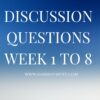Description
POLI 330N Final Exam – Question and Answers
- (TCO 1) Which best explains the differences between historians and political scientists?
- (TCO 1) Which are both true for most political scientists?
- (TCO 1) Voting for someone who is charismatic but whose policies might not benefit you would be considered _____ behavior.
- (TCO 1) Which of the following best exemplifies sovereignty?
- (TCO 1) The notion that you respect the U.S. Congress, even though it is controlled by a party with which you do not agree, pertains to _____.
- (TCO 1) Descriptions of political phenomena often lack _____.
- (TCO 1) The term for measuring with numbers is _____.
- (TCO 4) The English common law stressed the rights of free and equal men and was developed on the basis of precedent set by earlier judges, known today as _____.
- (TCO 4) Under which of the following circumstances might a case be pursued as both a criminal and a civil case?
- (TCO 4) The concept of judicial review falls under which article of the U.S. Constitution?
- (TCO 4) Who nominates and approves federal judges in the U.S. court system?
- (TCO 4) When was judicial review granted to the Supreme Court within the United States?
- (TCO 4) Examine the ideal role of American judges.
- (TCO 4) In Lombard v. Louisiana (1963), the Warren Court supported _____, ruling that blacks who had refused to leave a segregated lunch counter could not be prosecuted.
- (TCO 5) Countries with limits on government have usually had feudal pasts, which suggests what about the dispersion of power?
- (TCO 5) How often does the cabinet change in a parliamentary system?
- (TCO 5) Because of the separation of powers inherent in a presidential system, some scholars think that executive-legislative _____ is common in systems like that used in the United States.
- (TCO 5) Each division of government in a parliamentary system is headed by a _____.
- (TCO 5) Distinguish the process that a parliamentary system uses to oust a chief executive from the one available in the U.S. presidential system.
- (TCO 5) Describe how the election process in a parliamentary system slightly resembles presidential elections in the United States.
- (TCO 5) Explain which type of candidate parliamentary systems seek out to become ministers.
- (TCO 7) Radicals use the term political economy instead of _____ to describe their critique of capitalism and the inequitable distribution of wealth among nations.
- (TCO 7) How do Keynesian economic policies differ from the traditional laissez-faire policies developed by Adam Smith?
- (TCO 7) What event is largely considered responsible for deterring Johnson’s War on Poverty?
- (TCO 7) Differentiate between the rising costs of Medicare and Medicaid.
- (TCO 7) According to political scientist Ira Sharkansky, “All modern states are welfare states, and all welare states are _____.”
- (TCO 7) How does the American welfare state compare to those of other industrialized nations?
- (TCO 7) Many conservative economists argue that some banks are _____, because they would topple the rest of the economy with them.
- (TCO 9) _____ is a small or moderate change that essentially leaves the system intact poli 330n final exam
- (TCO 9) What is the relationship between a high sense of government legitimacy among the people and police officers when legitimacy is high?
- (TCO 9) What is likely to happen if the people are unhappy and there is no organization to focus their discontent?
- (TCO 9) What are the aims of terrorists via their calculated acts of terrorism?
- (TCO 9) According to Hannah Arendt, the American struggle was indeed a revolution, perhaps history’s only complete revolution, _____.
- (TCO 9) Why is the Middle East currently the breeding ground for considerable terrorist activity?
- (TCO 9) Hannah Arendt pointed out that rage is the fuel of revolution, but what is now the greatest cause of rage?






